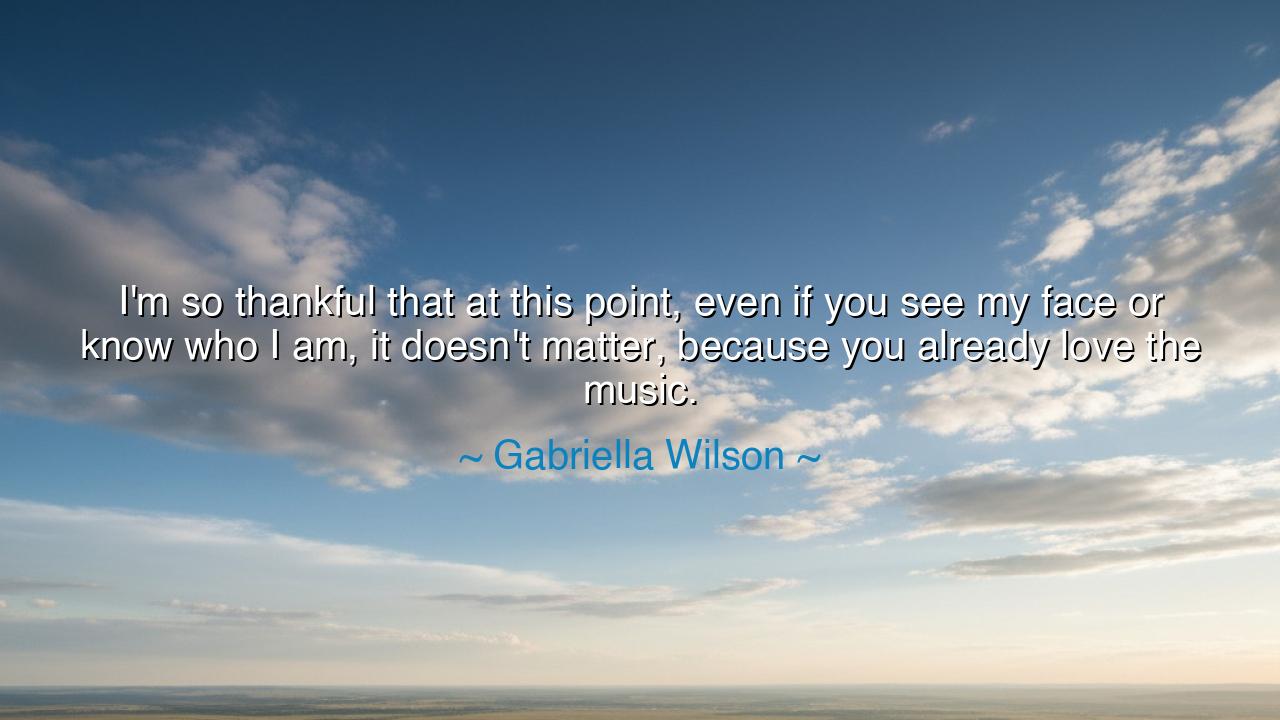
I'm so thankful that at this point, even if you see my face or
I'm so thankful that at this point, even if you see my face or know who I am, it doesn't matter, because you already love the music.






When Gabriella Wilson, known to the world as H.E.R., declares, “I’m so thankful that at this point, even if you see my face or know who I am, it doesn’t matter, because you already love the music,” she reveals the heart of an artist who has long sought to be judged by truth rather than appearance. Her words are a hymn to authenticity. In them, we hear the cry of one who resisted the shallow gaze of the world and chose instead to let her art speak before her image. This is the mark of humility and the triumph of substance over vanity.
From the earliest days of her career, Gabriella Wilson veiled her identity, choosing to let the songs carry their own weight. She knew the danger of an industry obsessed with appearance, where the artist’s face often overshadows the art itself. By hiding in plain sight, she gave listeners a chance to fall in love with what truly mattered—the power of her voice, the honesty of her words, the soul of her music. And now, when recognition has come, she rejoices that the love was first born from sound, not sight. This is why her thankfulness rings with such purity.
History remembers others who made the same choice to let substance triumph. Consider the poet Homer, who, though blind, gave us epics that outlived him. His face is forgotten, but his words resound through the ages. Or think of Emily Dickinson, who lived hidden away, yet wrote poems of such fire that they still burn today. Like them, H.E.R. reminds us that the truest art does not depend on outward form—it endures because it touches the eternal within the human spirit.
Her words also remind us of the great freedom that comes when art transcends the artist. When people love the music for itself, the creator is released from the burden of performance and pretense. She is no longer bound to maintain an image; she can simply be. In this freedom lies a sacred space where creativity flourishes unchained, and where honesty can pour forth like water from a spring. H.E.R.’s thankfulness is the gratitude of one who has tasted this liberation.
There is deep wisdom in her message. The world is quick to chase faces, to cling to celebrity, to hunger for images rather than truths. But images fade, and faces age. Only the essence of the work remains eternal. What the people truly love, what they truly remember, is not how the singer looked, but how the song made them feel. Beauty is fleeting, but music, when born of the soul, is immortal.
The lesson for us is clear: whatever you create—be it art, work, or legacy—let it be strong enough to stand without the mask of appearances. Strive to be known not for how you look or what you own, but for the depth of your truth, the sincerity of your offering. When people honor your work because it speaks to their spirit, then you have built something that will outlast time.
So let us carry Gabriella Wilson’s teaching: Be thankful when you are loved not for your face, but for your essence. Seek to create with honesty, to live with authenticity, and to give the world something that cannot be diminished by passing trends. For when the veil of appearances falls away, only the song of the soul remains—and it is this song that echoes across generations.






AAdministratorAdministrator
Welcome, honored guests. Please leave a comment, we will respond soon